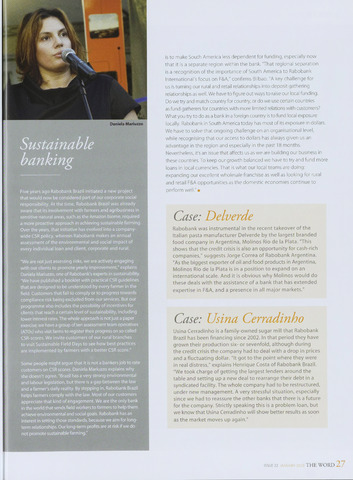Sustainable
CaseDelverde
Case: Usina Cerradinho
Oaniela Mariuzzo
is to make South America less dependent for funding, especially now
that it is a separate region within the bank. "That regional separation
is a recognition of the importance of South America to Rabobank
International's focus on F&A," confirms Bilbao. "A key challenge for
us is turning our rural and retail relationships into deposit gathering
relationships as well. We have to figure out ways to raise our local funding.
Do we try and match country for country, or do we use certain countries
as fund gatherers for countries with more limited relations with customers?
What you try to do as a bank in a foreign country is to fund local exposure
locally. Rabobank in South America today has most of its exposure in dollars.
We have to solve that ongoing challenge on an organisational level,
while recognising that our access to dollars has always given us an
advantage in the region and especially in the past 18 months.
Nevertheless, it's an issue that affects us as we are building our business in
these countries. To keep our growth balanced we have to try and fund more
loans in local currencies. That is what our local teams are doing:
expanding our excellent wholesale franchise as well as looking for rural
and retail F&A opportunities as the domestic economies continue to
perform well."»
Rabobank was instrumental in the recent takeover of the
Italian pasta manufacturer Delverde by the largest branded
food company in Argentina, Molinos Rio de la Plata. "This
shows that the credit crisis is also an opportunity for cash-rich
companies," suggests Jorge Correa of Rabobank Argentina.
"As the biggest exporter of oil and food products in Argentina,
Molinos Rio de la Plata is in a position to expand on an
international scale. And it is obvious why Molinos would do
these deals with the assistance of a bank that has extended
expertise in F&A, and a presence in all major markets."
Usina Cerradinho is a family-owned sugar mill that Rabobank
Brazil has been financing since 2002. In that period they have
grown their production six- or sevenfold, although during
the credit crisis the company had to deal with a drop in prices
and a fluctuating dollar. "It got to the point where they were
in real distress," explains Henrique Costa of Rabobank Brazil.
"We took charge of getting the largest lenders around the
table and setting up a new deal to rearrange their debt in a
syndicated facility. The whole company had to be restructured,
under new management. A very stressful situation, especially
since we had to reassure the other banks that there is a future
for the company. Strictly speaking this is a problem loan, but
we know that Usina Cerradinho will show better results as soon
as the market moves up again."
Five years ago Rabobank Brazil initiated a new project
that would now be considered part of our corporate social
responsibility. At the time, Rabobank Brazil was already
aware that its involvement with farmers and agribusiness in
sensitive natural areas, such as the Amazon biome, required
a more proactive approach in achieving sustainable farming.
Over the years, that initiative has evolved into a company-
wide CSR policy, wherein Rabobank makes an annual
assessment of the environmental and social impact of
every individual loan and cliënt, corporate and rural.
"We are not just assessing risks, we are actively engaging
with our clients to promote yearly improvement," explains
Daniela Mariuzzo, one of Rabobank's experts in sustainability.
"We have published a booklet with practical CSR guidelines
that are designed to be understood by every farmer in the
field. Customers that fail to comply or to progress towards
compliance risk being excluded from our services. But our
programme also includes the possibility of incentives for
clients that reach a certain level of sustainability, including
lower interest rates. The whole approach is not just a paper
exercise; we have a group of ten assessment team operatives
(ATOs) who visit farms to register their progress on so-called
CSR-scores. We invite customers of our rural branches
to visit Sustainable Field Days to see how best practices
are implemented by farmers with a better CSR score."
Some people might argue that it is not a bankers job to rate
customers on CSR scores. Daniela Mariuzzo explains why
she doesn't agree. "Brazil has a very strong environmental
and labour legislation, but there is a gap between the law
and a farmer's daily reality. By stepping in, Rabobank Brazil
helps farmers comply with the law. Most of our customers
appreciate that kind of engagement. We are the only bank
in the world that sends field workers to farmers to help them
achieve environmental and social goals. Rabobank has an
interest in setting those standards, because we aim for long
term relationships. Our long-term profits are at risk if we do
not promote sustainable farming."
issue 22 THE WORD 2

